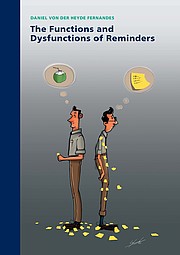The Functions and Dysfunctions of Memory Cues Defended on Friday, 25 October 2013
Not many people use memory cues. For example, only 50% of consumers make shopping lists. If memory cues are important for memory (as previous research shows), why don’t people use them more often? In the first essay of my dissertation, I found that people don’t use memory cues because they are overconfident about their memory. That is, consumers often incorrectly predict that they will remember to do something, do not take appropriate actions to help them remember (e.g., write a shopping list or stick a Post-It on the fridge or the steering wheel) and end up forgetting to do what they should be doing (e.g., buy grocery items, pay bills, take the baby out of the car).
But do reminders always help task completion? Almost all previous research on prospective memory and implementation intentions finds that reminders help people execute tasks. Very few papers found no effects of reminders on task completion (3 papers). Those three papers examined the effect of reminders in the context of multiple tasks. The second essay of my dissertation shows that, when multiple tasks are involved, reminders sometimes benefit, but sometimes harm task completion. Reminders help people high in propensity to plan to resume an interrupted task in the future and to maintain vigilance for opportunities to complete it. But they harm the execution of other tasks that demand immediate attention. On the contrary, reminders hurt those low on propensity to plan to resume an interrupted task and they decrease the urgency to start working on the task. But they also free up cognitive resources to be used for other tasks that require immediate attention.
Companies often send special deals, early bird specials, and other promotions that may work as reminders to buy the product. These reminders may accelerate the purchase of the product among consumers high on propensity to plan. But, it may delay the purchase of the product among consumers low on propensity to plan. Companies also send reminders when they send its customers information about hotel and theater reservation or confirmations, bills to be paid, subscriptions to be renewed, prepaid cell phone credit to be topped up. Consumers use reminders for several tasks including going out for groceries, eating healthy, housekeeping and maintenance, taking medicines, calling for pizza. It is important to understand for whom the reminder helps and for whom it hurts task completion and performance such that companies and policy makers can tailor appropriate interventions for different groups of individuals. For example, propensity to plan is related to income, education and strongly related to the FICO credit scores. Perhaps for those at the bottom of the income distribution, for those with low education levels and for those with low FICO credit scores, reminders should not be used. Among those individuals, a more effective intervention to get something done might be to ask them to either perform the task immediately or as soon as possible. In that case, procrastination is discouraged and, hence, tasks are more likely to be completed.
Keywords
memory cues; goal completion; planning; shopping list; grocery shopping; prospective memory; multiple tasks; metacognition












